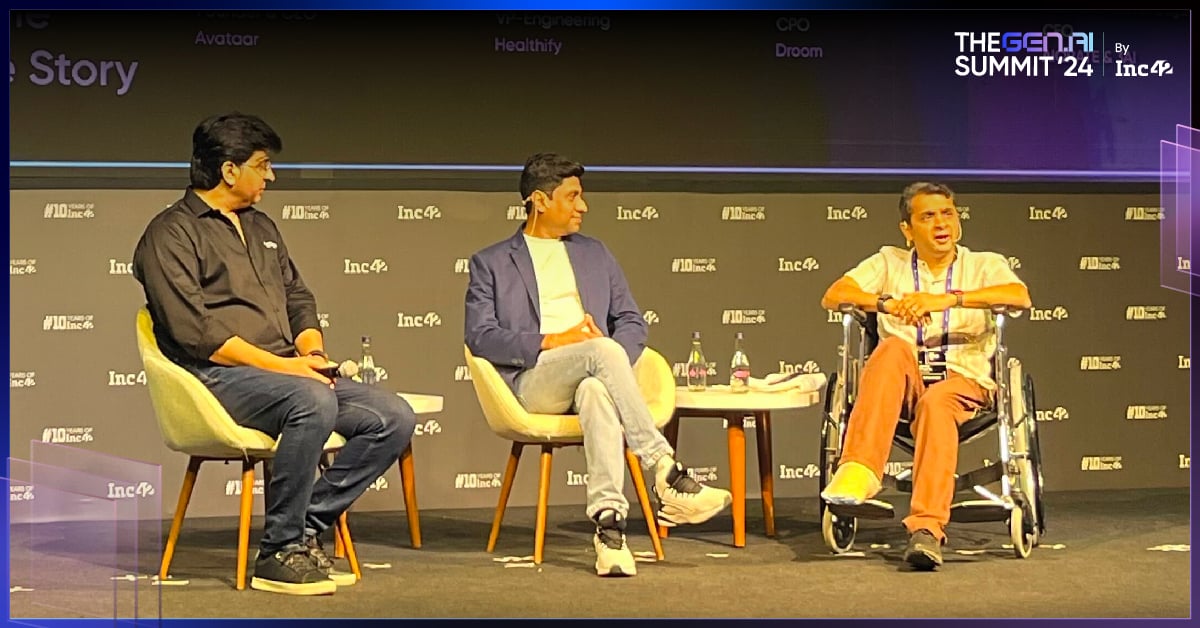SUMMARY
Healthify CTO Khasnis said that GenAI has the potential to remove the “search box” from ecommerce sites, as customers will directly interact online to make purchases
Khasnis was speaking at Inc42’s ‘The GenAI Summit’ during a panel discussion on the topic “How GenAI Is Rewiring The Indian Digital Commerce Story”
Aluru cofounder Sravaanth Aluru highlighted the cost and time efficiency GenAI provides to enterprises, and said they would continue to use the technology
The onset of artificial intelligence (AI) has impacted businesses and industries across the globe in some way or other. Realising the importance of the technology, the ecommerce sector was among the first ones to leverage AI.
Ecommerce players have been utilising generative AI for some time to interact with their customers and enhance shopping experience.
Talking at Inc42’s ‘The GenAI Summit’, Healthify CTO Abhijit Khasnis said, “GenAI will bring the offline shopping experience to the online experience.”
lockquote>
He was part of a panel discussion on the topic “How GenAI Is Rewiring The Indian Digital Commerce Story”.
Khasnis said that GenAI has the potential to remove the “search box” from ecommerce sites, as customers will directly interact online to make purchases, just the way they do offline shopping.
Bengaluru-based Healthify has been bullish on AI and has adopted GenAI to enhance its chatbot ‘Ria’ and build ‘Snap’ – a photo-to-food recognition system. Besides, it has also partnered Swiggy so that users can order diet-aligned meals, recommended by Ria, from the foodtech platform.
Khasnis said that the startup initially used AI to help its customers understand what they have been consuming by just clicking the picture of their food.
Talking about the benefits of GenAI to enterprises, Aluru cofounder Sravaanth Aluru said that companies are seeing positive results by integrating GenAI. “If you look at the cost and time efficiency that GenAI has to offer, I will say it is (GenAI) is here to stay.”
However, both of them also noted that GenAI currently requires some form of human interference.
“I feel GenAI is in a co-pilot stage at the moment, where it still needs some form of human interference for a final check at the end,” Aluru said.However, Khasnis also pointed out the limitations of GenAI when it comes to enterprise use cases. He said that customers need “personalised” interaction and they can easily identify if they are interacting with a chat bot or a human being.
On the impact of AI on jobs, Alluru said initially the perception was that AI would impact low-paying jobs. However, the opposite is happening currently and a number of high-paying jobs are being impacted because of GenAI.
Disclaimer
We strive to uphold the highest ethical standards in all of our reporting and coverage. We StartupNews.fyi want to be transparent with our readers about any potential conflicts of interest that may arise in our work. It’s possible that some of the investors we feature may have connections to other businesses, including competitors or companies we write about. However, we want to assure our readers that this will not have any impact on the integrity or impartiality of our reporting. We are committed to delivering accurate, unbiased news and information to our audience, and we will continue to uphold our ethics and principles in all of our work. Thank you for your trust and support.



![[CITYPNG.COM]White Google Play PlayStore Logo – 1500×1500](https://startupnews.fyi/wp-content/uploads/2025/08/CITYPNG.COMWhite-Google-Play-PlayStore-Logo-1500x1500-1-630x630.png)